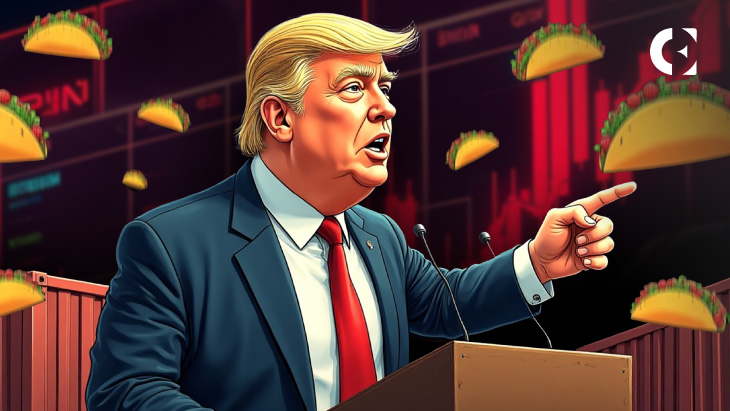- President Donald Trump dismisses “TACO trade” nickname for his tariff strategy swings.
- Trump delayed 50% EU tariffs to July 9, calling it “negotiation,” not “chickening out.”
- The “TACO trade” term refers to Trump announcing high tariffs then often easing them.
U.S. President Donald Trump today pushed back hard against questions about a new nickname mocking his administration’s shifting tariff strategies: the “TACO trade.” Coined by a Financial Times columnist, the term stands for “Trump Always Chickens Out” and highlights a pattern where high tariffs are announced, only to be rolled back or delayed shortly after.
Trump Delays 50% EU Tariff to July 9 After Von der Leyen Request; Markets Rally
Trump’s most recent trade action involved a proposed 50% tariff aimed at goods from the European Union (EU). This duty was initially set to kick in on June 1 but has now been postponed until July 9. The delay came after a request from European Commission President Ursula von der Leyen. Financial markets gave a thumbs-up to this extension; in the Tuesday trading session right after Trump’s Sunday announcement of the delay, stocks rallied across major indexes.
Just days before that, markets had actually dipped when Trump publicly declared that the 50% EU tariff would definitely proceed. Trump later took credit for the tariff threat, saying it restarted stalled trade negotiations with the EU. “After I did what I did, they said, ‘We’ll meet anytime you want,’” he remarked on May 28.
Related: Crypto Market Rebounds As President Trump Extends EU Tariff Deadline To July 9th
Trump Calls “TACO Trade” Label “Nasty”; Insists Tariff Delays Are “Negotiation” Tactics
When a reporter asked him about the “TACO trade” label during a press interaction, President Trump responded with visible frustration. “Oh, I chicken out. Isn’t that nice? I’ve never heard that,” he said, calling the question “nasty” before vigorously defending his recent decisions. He emphasized that delaying tariffs or lowering them is all part of a broader negotiation strategy. “You call that chickening out? It’s called negotiation,” he shot back.
Financial Times columnist Robert Armstrong first introduced the “TACO trade” nickname earlier in May. It describes how some market participants reportedly trade on this pattern: buying into market dips caused by Trump’s initial tough tariff announcements, anticipating a rebound when those tariffs are later eased or withdrawn.
Pattern of Policy Swings: Previous “Reciprocal” and China Tariffs Also Saw Sharp Reversals
This isn’t the first time markets have seen such tariff policy swings under the current administration. On April 2, for instance, President Trump introduced a sweeping set of new “reciprocal” tariffs that affected imports from every country, with rates hitting 30% or even more. But within a week, and after a period of noticeable stock market volatility,
Related: Bitcoin Soars Past $103K as US and China Announce Tariff Cuts to 30% and 10%
Trump announced a rollback of those tariffs down to 10% for a temporary 90-day period. The markets surged strongly following that decision, marking one of the most significant single-day rallies in recent history. A similar cycle played out with China. After enacting tariffs as high as 145% in April, Trump then reduced them to 30% in May after new trade talks began with Beijing.
Disclaimer: The information presented in this article is for informational and educational purposes only. The article does not constitute financial advice or advice of any kind. Coin Edition is not responsible for any losses incurred as a result of the utilization of content, products, or services mentioned. Readers are advised to exercise caution before taking any action related to the company.







